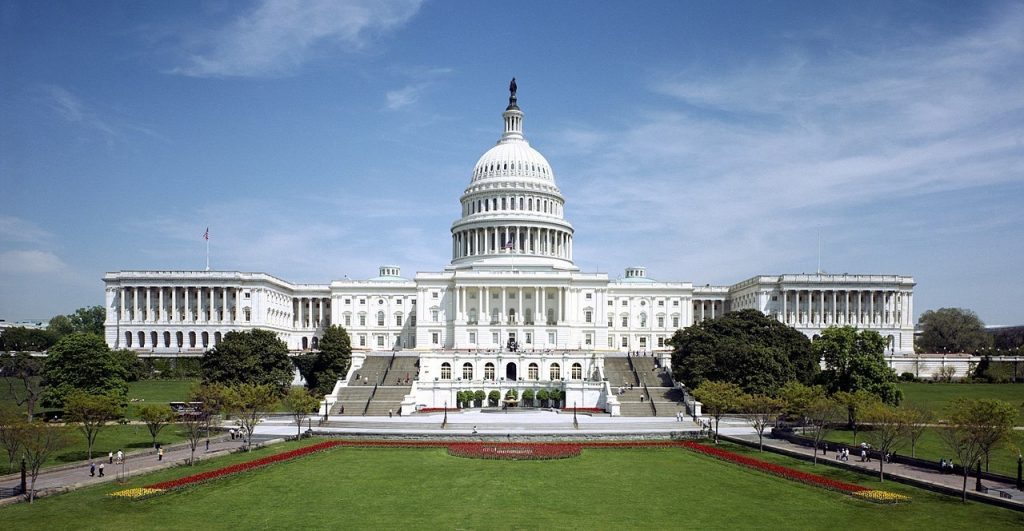
As of Friday afternoon, the House & Senate have both passed H.R. 748, the CARES Act, which provides roughly $2 trillion to individuals, businesses, and states in response to the global coronavirus pandemic. The bill, negotiated between the House, Senate, and administration, and now awaiting the President’s signature includes:
- $500 billion for loans and assistance to companies and state and local governments, including $29 billion for loans to U.S. airlines and related businesses.
- $349 billion in low-interest small business loans that could be partially forgiven
- Payments of as much as $1,200 for individual taxpayers, and $500 per child, phased out when incomes exceed $75,000 for individuals and $150,000 for couples filing jointly.
- An additional $600 per week for those receiving unemployment benefits.
- $150 billion for aid to state, local, and tribal governments.
- A suspension of Medicare sequestration through the end of the year and the extension of several health programs until December.
The bill also provides about $342 billion in emergency supplemental funding, including $100 billion for hospitals.
Below we detail only some of the bill’s major highlights. For more detail, please reach out to us at DMGS directly.
Financial Support
The bill provides $500 billion to the Treasury Department’s Exchange Stabilization Fund, to be used to make loans, loan guarantees, and other investments to businesses, states, and municipalities in 2020.
Of that $500 billion, the bill provides as loans and loan guarantees as much as:
- $25 billion for passenger airlines, ticket agents, and aviation inspection and repair services;
- $17 billion for businesses critical to national security. Some of the funds are likely intended for Boeing Co; and
- $4 billion for cargo airlines.
The bill provides $32 billion to the Treasury Department for financial assistance to the aviation workforce. The aid is limited to $25 billion for passenger airlines, $4 billion for cargo airlines, and $3 billion for catering and ground support contractors. Funds may only be used to pay employees, except for $100 million that the Treasury Department could use for administration.
Small Business
The bill establishes a new Paycheck Protection Program to let small businesses, nonprofits, and individuals seek loans through the Small Business Administration’s 7(a) loan program. The bill authorizes $349 billion in total 7(a) lending from Feb. 15 through June 30. It also provides $349 billion for the SBA to fully guarantee loans under the new program. Loans will be available during the covered period for:
- Any business, nonprofit, veterans group, or tribal business with 500 or fewer employees, or a number set by the SBA for the relevant industry;
- Sole proprietors, independent contractors, and eligible self-employed workers; and
- Hotel and food service chains with 500 or fewer employees per location.
Recipients of SBA-guaranteed loans under the Paycheck Protection Program can apply for loan forgiveness over eight weeks for eligible payroll costs and for mortgage interest, rent, and utility payments.
The bill provides $10 billion to expand the SBA’s disaster loan program from Jan. 31 through Dec. 31 to cover businesses, cooperatives, employee stock ownership plans, and tribal businesses with 500 or fewer employees, as well as sole proprietors and independent contractors.
The bill allows businesses with as much as $7.5 million in debt to qualify for a streamlined Chapter 11 bankruptcy process, increasing the current debt limit of $2.73 million for eligible small businesses.
Taxes & Rebates
The bill provides refundable tax credits of as much as $1,200 per individual or $2,400 for couples who file joint tax returns. An additional $500 would be provided for each child.
The bill defers employer payroll and railroad retirement tax payments through the end of 2020. Deferred funds will be paid over two years in 2021 and 2022.
The bill establishes a refundable credit against employer payroll and railroad retirement taxes for certain employers that are hurt by the coronavirus but retain their employees. The credit would be for 50% of eligible employee wages paid after March 12, 2020, and before Jan. 1, 2021. It would be provided for as much as $10,000 of compensation, including health benefits.
The bill includes several retirement plan allowances that are often provided in legislation after major disasters.
The bill creates a $300 above-the-line individual charitable contribution allowance for individuals who do not itemize their returns for tax years beginning in 2020. The bill also suspends the limit on the individual charitable deduction for 2020 .
Employer student loan repayment assistance paid after the bill’s enactment and before Jan. 1, 2021, are excluded from employees’ income tax. Repaid amounts count toward a $5,250 limit on other forms of employer-provided education assistance, such as tuition and related expenses, which can be excluded from income.
The bill allows business losses from tax years after Dec. 31, 2017, and before Jan. 1, 2021, to be carried back five years. Net operating loss carrybacks were eliminated for most businesses by the 2017 tax overhaul. Separate rules would apply to real estate investment trusts and life insurance companies.
Unemployment & Paid Leave
The bill provides an additional $600 per week in “federal pandemic unemployment compensation” to individuals receiving unemployment benefits. The extra payment would remain available through July 31, 2020. It would be excluded when determining eligibility for Medicaid and the Children’s Health Insurance Program (CHIP).
States can have 100% of their costs covered for supporting “short-time compensation” programs through Dec. 31, 2020. The voluntary programs provide workers with prorated unemployment benefits to offset work reductions made by their employer in lieu of a layoff.
The bill amends the emergency sick leave program enacted under the second coronavirus response bill.
Health Provisions
The bill suspends automatic Medicare payment cuts to hospitals and doctors from May 1 through Dec. 31. The bill also extends for one year, through 2030, the broader sequestration of mandatory funding, including Medicare payments.
Hospitals would receive a 20% increase in their Medicare payments for treating a patient with Covid-19 during the coronavirus emergency.
The bill removes a requirement from the first coronavirus response bill (Public Law 116-123) that a doctor had to have treated a patient within the last three years to use expanded telehealth authorities under Medicare.
Medicare Part B will fully cover a COVID-19 vaccine without any cost-sharing. Drug plans must allow Part D prescription drug beneficiaries to receive a 90-day supply of medication during the public health emergency.
The bill waives a requirement that patients at inpatient rehab facilities receive at least 15 hours of therapy per week during the emergency period.
Education
The bill allows the Education Department to waive requirements related to institutions’ eligibility for and allotment of federal financial aid, as well as certain reporting requirements. The department has broad authority to waive provisions to ensure that schools receiving federal aid are not adversely affected by formula-based calculations during the coronavirus emergency.
Consumer Protections
Borrowers with federally backed mortgages who attest that they are experiencing financial hardship due to COVID-19 may suspend their payments for 180 days, with a possible 180-day extension. They will not accrue additional interest or fees during that period.
Lenders and other businesses may allow consumers affected by COVID-19 defer or suspend their debt payments or make partial payments from Jan. 31 through 120 days after the bill is enacted or the coronavirus emergency ends.
Latest News
In our latest episode of the Back in Session podcast, we had the pleasure of hosting Pennsylvania State Representative Tim O'Neal. Our conversation covered a range of topics from the recent state budget to election [...]
Photo credit: iStock.com/naturalbox The debate over raw milk legislation has intensified in 2024, with several states introducing or passing bills that address the sale and distribution of unpasteurized dairy products. Raw milk has not undergone [...]
Photo credit: iStock.com/bit245 Over the July Fourth holiday, many Americans will be grilling and barbecuing with their families and friends. A 2020 survey showed that Independence Day is the most popular holiday for grilling. In [...]
Photo credit: iStock.com/vlastas As states across the country wrestle with energy challenges and climate goals, lawmakers are increasingly turning to nuclear energy as a viable solution. Nuclear power, known for its reliability and zero-emission benefits, [...]






Stay In Touch